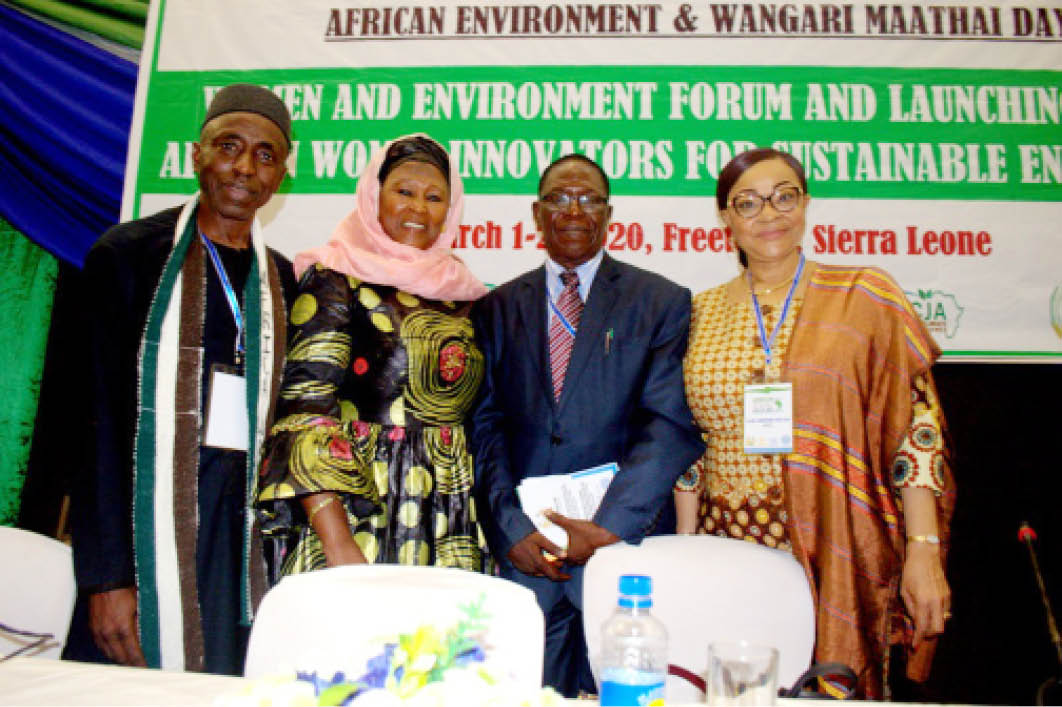Experts and environmental advocates at the ongoing Women and Environment Forum in Freetown, Sierra Leone, have lamented the poor involvement of African women in decision making and unequal access to natural resources, saying, it is hampering the effectiveness of responses to climate change.
They said women in developing countries are particularly vulnerable to climate change because they are highly dependent on local natural resources for their livelihood and thus, should play key roles in policy and decision making.
The Senior Policy Officer representing the African Union Commission, Almami Dampha, said there is inadequate representation of African women at all levels of policy formulation and decision making in natural resources, environmental management, conservation, protection and rehabilitation as well as peace building and conflict prevention.
Dampha stated this at a Women and Environment Forum, as part of events to mark the African Environment and Wangari Mathai Day organised by the Commission in partnership with the Sierra Leone Government in Freetown, on Sunday, with the theme: “Our Resources, Our future.”
While noting that women are at the centre of sustainable development as enshrined in the Africa Agenda 2063 and Sustainable Development Goals, he said they are entitled to a peaceful, healthy and productive life, in harmony with nature.
“Women have an indispensable role in achieving these noble goals. Their role is essential in promoting sustained natural resource management and prevention of conflicts,” he said.
According to the AUC official, women play leadership roles in promoting environmental ethics, and their contributions to environment management and protection have often taken place at the various levels.
He said the aim of the forum is to raise political awareness on strengthening regional and national policies and strategies that would enhance women’s access to land and other natural resources.
“Indigenous women have particular knowledge of ecological linages and fragile ecosystem management. Women in Africa can take courage from the late Professor Wangari Maathai of Kenya who devoted her entire life to environmental protection and conservation, and remains an immortal global icon,” he said.
Also speaking, the Sierra Leone Minister of Environment, Professor Foday Moriba Jaward, said women are life givers and primary users of the land, forest, water and other natural resources that are crucial for livelihoods of rural households and communities, but in many cases, they are not the custodians or trusted to manage the environment where they grow.
“They are denied access to their legal rights to land and property. They lack equal access to the utilisation of natural resources, leadership positions, education, and financial services,” he added.
Prof. Jaward, who noted that the challenge is not just about gender but under representation and lack of empowerment, said the forum must focus on how to fast track economic, social and political opportunities for women.
He said as women constitute 50 per cent of their total population, his ministry in partnership with relevant ministries will adopt and strengthen sound environmental policies and enforceable legislation to support the access and control of natural resources, and promote their economic empowerment.
The Resident Representative of United Nations Development Programme (UNDP), Mr. Samuel Doe, lamented that women are more exposed to the adverse effect of climate change, saying, “Drawing on women’s experiences, knowledge and skills, and supporting their empowerment will make climate change responses more effective.
According to him, women in developing countries are particularly vulnerable to climate change because they are highly dependent on local natural resources for their livelihoods.
“Women charged with securing water, food and fuel for coking and heating, face the greatest challenge. Women experience unequal access to resources and decision making processes, with limited mobility in rural areas. It is thus important to identify gender sensitive strategies that respond to the challenges that affect women,” he said.
He maintained that the impacts of gender inequality and women’s recurrent socio-economic disadvantages continue to be ignored.
“As the world continues to grabble with what a post-kyoto climate regime should look like, it is critical that mitigation and adaptation efforts integrate gender issues at all levels. This will minimise risks to women and children, and ensure greater success of efforts to address climate change,” he said.
Women participants, however, agreed that until women become economically viable, it will be difficult for them to achieve their dreams and manage natural resources effectively.

 Join Daily Trust WhatsApp Community For Quick Access To News and Happenings Around You.
Join Daily Trust WhatsApp Community For Quick Access To News and Happenings Around You.
